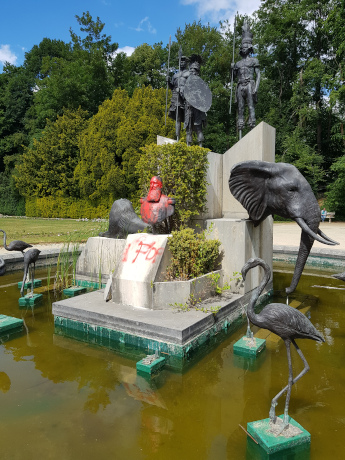Black Lives Matter
Statement by the museum, June 11, 2020
On June 3rd, the AfricaMuseum announced its support for the #BlackLivesMatter movement at the museum entrance and on social media. In fact, the museum was established in 1898 as a scientific institution for the dissemination of colonial propaganda and support of colonial activities in Belgium. The museum has long conveyed a message of Western supremacy, deeply rooted in racism. We acknowledge this and we see the fight against racism as part of our own decolonisation process. We regard colonialism as an immoral form of governance, based on military occupation of a country, authoritarian and racist governance, and exploitation of a country's wealth for the benefit of the coloniser.
Immediately after our post, some activists condemned our message to support the #BlackLivesMatter movement, because they thought it was hypocritical. Some even felt that we were appropriating a battle that was not ours. Of course, that was not our intention. We regret that this action has offended some people.
We are well aware that the museum, through its history, has played an important role in Belgium and Europe in creating prejudices against Africans. We are convinced that today the museum has immense potential as an awareness-raising tool and as a forum for debate on fundamental themes in our society, such as colonial history or racism and its roots in colonial propaganda. These topics are important themes in our permanent exhibition, and are regularly the focus of events organised by the museum.
We are also aware that the museum keeps objects in its collections of which it is not the moral owner. Part of the museum's collections were acquired in a context of violence, injustice and unequal relations, especially during the period of Congo Free State. This story is also told in our permanent exhibition and we actively participate in the ongoing debates on the return of African cultural heritage, and in a dialogue with involved African actors. We enter into an open and constructive dialogue with representatives from the museum field and with Belgian and African authorities, as well as with Belgians of African origin. Our policy on restitution is transparent and is explained on our website. In this context, we have also set up a residency programme for independent African scientists to investigate the circumstances in which these collections were acquired. The AfricaMuseum also has a strict code of ethics for the organisation of events.
We would also like to point out that the sculpture group with the bust of Leopold II located in the park near the museum does not fall under our jurisdiction, but under that of the park management. Nevertheless, since the beginning of the 21st century, the museum has been undergoing a process of decolonisation and we feel it is essential to contextualize the statues of controversial figures from the colonial period, such as Leopold II. In this context, we encourage the local authorities to engage in a dialogue with the communities for whom these statues represent a strong and painful symbol of the colonial period. Thus, the museum takes the initiative to discuss the future not only of the group of sculptures in the park but also of other colonial representations in the municipality of Tervuren with the relevant authorities.
We hope that this message shows our support for the anti-racism movement and we regret that we have hurt people with some of our messages.
